
As mentioned in a previous post, my short story, “Quantum Quietus,” won 1st place in the 2017 N3F short story contest. They have since published it in Eldritch Science. Since there were no terms of exclusivity, I am free to publish here for you all to read. I hope you enjoy the free story!
Quantum Quietus
By Philip A Kramer
Joe threw the ball too hard this time. He held his breath as it left the small, inner-city park, and plummeted toward the crowded sidewalk. Even Artemis, his black lab, stopped short and watched its descent.
The ball was seconds away from hitting a man, when the stranger turned, reached out a hand, and caught it.
“Take your pills,” he called and tossed the ball to the waiting dog. The man carried on down the sidewalk, shaking his head.
“Thanks,” Joe called back with an apologetic wave.
He shouldn’t have worried. These days, almost everyone was on Quantanax, the latest drug from Prescience Pharmaceuticals. It gave people the near supernatural ability to see into the future. With just a few seconds of foresight, their reflexes became quick, their actions unerring, and their mistakes erased before they ever happened. They called it Feedback, the new sixth sense.
Had things turned out different, Joe could have been like them. His life would be free of unpredictability and hardship, better in every way. Unfortunately, he was among the small percentage of the population allergic to the treatment.
A sour envy formed in the pit of his stomach. He tried to suppress the feeling; nothing good had ever come of it. His bitterness had pushed away all of his closest friends, ruined his marriage, and made him regret everything he did.
The tennis ball rolled to a stop between Joseph Dunham’s feet. Artemis turned in a quick circle a few feet away and then sat flat on the grass in polite anticipation. Her body quivered with pent-up energy.
Joe’s fond smile was short-lived. They’d have to leave soon. Artemis would chase just about anything that flew, and with more people gathering, he didn’t want her running off with a Frisbee or baseball.
Already a pair of youths had started a game on the tennis court beside the small Brooklyn park. They couldn’t have been more than twelve years old, but they played better than any seasoned athlete Joe had ever seen. There was no end to the advantages of Quantanax.
“Tomorrow,” he told Artemis as he stooped to pick up the ball. He grimaced as his fingers encountered a film of slobber. He placed the ball in the pocket of his windbreaker and withdrew a leash.
All the energy evaporated from the dog when he clipped the leash to her collar.
It was getting dark, and the smell of rain was in the air, making the pub across the street stand out like a warm, bright beacon. The crowded establishment should have turned him off straightaway, but he had gone far too long without human contact, long enough to forget how pointless it was. In the end, he decided he was hungry and could use a drink.
He tugged the leash and trotted across the street between cars. He was not worried for his life. Even on this highly travelled street in Brooklyn, accidents were rare.
Joe tied off the leash to a bike rack just outside the door to the pub and tousled the lab’s black, floppy ears.
Patrons occupied all of the tables inside, but a few seats remained empty at the bar.
Joe claimed a stool and ordered a drink and a sandwich. The man to his right had his laptop out at the bar, seemingly oblivious to everything around him. To his left sat a woman with large glasses, their dark frames extending below her cheekbones. She wasn’t his type, but a beer or two could change that. He should talk to her, some part of his brain insisted, but instead, he turned his attention to the TV above the bar.
He hadn’t always been this shy, but these days he regretted every word out of his mouth. Without the feedback granted by the treatment, he had no way of knowing what effect his words would have. Everyone else could stop themselves from making a social blunder, but he would always be a blabbering idiot.
The bartender arrived with his drink, but as he accepted the beverage, a bit of it sloshed onto the bar-top. A towel appeared from the bartender’s back pocket, and he mopped up the spill. Joe offered a quiet apology.
When the bartender withdrew his hand, a bright yellow pill sat on the bar.
“We all forget to take it sometimes,” the bartender said.
Joe grunted and nodded his thanks. He swept the pill from the bar, pretended to pop it in his mouth, but slipped it into his pocket instead.
Ever since the government had subsidized the Quantanax, everyone was handing it out like candy, candy that could kill him in minutes. As if he weren’t enough of an outcast, this same government now mandated that people like him wear a medical bracelet because of their propensity for accidents. Joe never wore his. This small act of rebellion was all he had left.
Just then, a scattering of applause rose out of the comparative quiet. On the TV above the bar, a Yankee batter hit a home run a moment later and began running the bases.
Joe settled in to watch as he waited for his food. He enjoyed baseball more than he ever had before, though he usually watched when not in the company of people who would moan or applaud before the ball left the pitcher’s glove. Forbidden from receiving Quantanax, the players always displayed genuine surprise and frustration. Even these famous and talented players spilled their beers, Joe told himself.
Then, all around him, conversations trailed off, and the TV went dark. A tall figure walked onto the screen. A white mask obscured his face, and he wore only white clothing. The man glowed in the darkness, illuminated by some hidden black lights. The mask made his eyes look like deep, black pits, and the line of his mouth, a chasm.
“Greetings, New York,” the figure said in a voice that was more robot than human. The slit of his mouth did not move with the words.
“What’s this?” said the man to Joe’s right, breaking his trance.
“Some sort of advertisement?” Joe hazarded.
“I’m delighted to see humanity ascend into the Quantum Era.” The man on the screen continued in his digitally synthesized voice. “It’s a glorious time for our society. We’ve come a long way these last few years. Murder, suicide, and countless other preventable deaths are at an all-time low. We now excel at everything we do and have few regrets. Our lives are finally falling into place.”
Joe became more and more certain that this was an advertisement, a reveal of the latest version of Quantanax. This man would promise to make everyone’s lives even better, while Joe, and those like him, fell further and further behind. He glanced out the window to see Artemis, tangled in her leash. Rather than attempt to extricate herself, she slumped to the ground and licked at her paw. Joe considered getting up and leaving, but the air in the bar had become tense and uncertain.

“But, unfortunately, this makes us more vulnerable than we’ve ever been before.” The man reached out as if to pinch something, and then with a swift motion, a cart materialized. It wasn’t magic, but a black cloth, making the cart invisible under the glow of the black light. Atop the cart sat a large, cylindrical device with a metallic sphere in its center.
Gasps and moans of dismay erupted throughout the room.
“I have hidden this nuclear weapon somewhere in this city.”
It was now Joe’s turn to gasp, and the man next to him spewed a mouthful of beer onto his laptop.
“Is he serious?” the man asked between curses as he attempted to mop up the beer on the keyboard.
Joe didn’t answer. A knot of terror had formed in his throat.
“I’ve armed the bomb with a quantum random number generator,” the white clothed figure said. His gloved fingers encircled a small handheld device on the cart and lifted it to eye level. “It could detonate the moment I press this button, or any time in the next twenty-four hours. It’s impossible to say. If humanity continues to allow the principles of quantum uncertainty to direct our future, it will discover just how uncertain that future is.”
Anguished cries filled the room as the man lifted his thumb and brought it down onto the button.
People fell. Joe’s head swiveled from side to side, mouth agape as the other patrons crumbled to the ground or slumped in their chairs. To a one, their limbs jerked from side to side as if to fend off some unseen threat. Above the screams and the staccato thumps of bodies and chairs hitting the floor, he could hear Artemis barking from outside and the sound of cars crashing into one another.
The woman with the large glasses struck her head on the bar as she fell. Joe leapt down from his seat to kneel over her. Her glasses lay broken beside her, and blood streamed from a gash above her eyebrow. She continued to spasm and flinch, oblivious to the injury.
The man on the TV spoke again, his voice calm and robotic.
“Those of you hearing me now, for one reason or another, you have chosen not to partake in the treatment. You have inherited this city. You can leave it or stay, that is up to you.”
The station returned to its regular broadcast.
Fallen bodies littered Yankee stadium. The players on the field, banned from the treatment as they were, wheeled in slow circles. Their fans, who had been cheering for them moments ago, now convulsed in their seats.
The woman in front of Joe curled into the fetal position, her body still spasming. Her heart thundered beneath his hand where it rest on her back.
“What’s happened to them?” Joe asked. His mouth had gone dry, and the words came out as a quiet rasp.
“They’re experiencing their deaths.”
Joe turned to see the other man from the bar. He was wearing a loose red tie and an unbuttoned blazer. He gaped at the chaos around them. They were the only two not writhing on the ground.
“What?”
“To them, the bomb is detonating every second,” the man said.
“But the bomb hasn’t gone off.”
“Not in our reality.”
Joe didn’t waste time puzzling over the man’s words. Seeing the woman would not hurt herself, he stood and went to check on Artemis, who was barking with increasing insistence.
After untangling Artemis from her leash, he pulled her in the direction of their apartment. Dozens of cars had piled into each other outside the bar, their occupants seizing. As he trotted across the street, shattered safety glass crunched beneath his feet, and a lone hubcap rolled to a stop a few feet away.
“Where are you going?” called a voice from behind him.
“Leaving,” Joe said, not looking back. The thought of a bomb in the city, one that could go off at any second, filled him with an irresistible urge to get out, to see the city shrink in his rear-view mirror.
“We can’t leave. What about all of these people?”
Joe slowed to a stop on the other side of the street and brushed a cold raindrop from his cheek. How could he possibly help them? They were all dead weight. Then he thought of the women in the bar. She was small and light enough to carry as were the two youths he’d seen in the park.
“I’ll try to get a few people in my car, leave the city. You said it was the bomb doing this. If I drive far enough…”
“Not with roads as they are. You’ll never get out in time.”
Joe hung his head. If all of the roads looked like this one, walking was the only way out, and then he could only save himself.
The man stepped out from the shelter of the bar. Rain spotted his red tie, and a growing breeze tousled his brown hair. His eyes studied Joe.
“We have to find the bomb and shut it down.”
Artemis stared up at Joe with dark, worried eyes that blinked as rain pelted her black fur.
He had friends and coworkers in this city. There were babies out there crying for their parents. All of his problems: his allergy, his failed relationships, they were nothing compared to the raw torment of those inside the bar.
Joe met the man’s eye and nodded.
The man sighed.
“What’s the plan?” Joe asked as he walked back to the entrance of the bar.
“We need to narrow down the search area somehow. There are tons of live traffic and weather cameras all over the city. If I see people unaffected, they are probably too far away from the bomb. The bomb should be near the epicenter.”
“That sounds like it’ll take a lot of time.”
“We already have two data points. If it is affecting those here and the stadium, its epicenter should be somewhere in Manhattan. I can try to narrow it down as we walk.” The man glanced at his laptop on the bar as if to reassure himself the other patrons were not going to steal it, and then started walking.
Heart racing, Joe followed. Never in his life would he have guessed he’d willingly travel in the direction of a bomb.
While they walked, rain darkened the sidewalk. His companion slouched over his phone to keep off the rain as he searched live traffic feeds. Joe slowed as they crossed an intersection littered with broken-down cars. The vehicles that hadn’t already crashed were idling forward, grinding alongside other cars until they encountered something immovable. Their occupants twitched and thrashed just as violently as those on the sidewalks.
“You said they were experiencing their deaths. How?”
“Do you know how the Quantanax works?” The man asked, not looking up from the phone.
“Not really,” Joe replied. He was an electrician, not a scientist. He had heard peoples’ accounts of the experience though. It was like waking up, they said, a sudden restoration of all senses and emotions. Some called this the quantum era, but most called it the Awakening.
“It’s in the name. ‘Quanta’, for quantum state, and ‘Na,’ the atomic symbol for sodium. The drug binds to and activates sodium channels in the brain. There are two electrons in the molecule that become quantum entangled. There are some complicated physics involved, but simply put, this entanglement occurs over time, not distance. When they experience something, it activates sodium channels a few seconds in the past, making their neurons fire and imparting a kind of foresight.”
“But more than a few seconds have passed and there hasn’t been an explosion.”
“That’s where the other realities come into play. You’ve probably heard the argument before. If this drug gives you the power to change the future, was it really the future to begin with? If you stomp on your brakes to avoid a car accident, where does the feedback come from now that you’ve prevented the accident?”
“So you change the future, so what?”
“Breaking causality causes all kinds of contradictions. The only way it can happen is if the Many Worlds Interpretation is true. For every decision, for every instance of quantum uncertainty, a new reality is made, one where you were always going to slam on your brakes.”
“So… they’re experiencing an explosion in another reality, but then they come here, to a version of our world where the bomb hasn’t gone off yet?”
“Precisely. It’s the timer he’s got on that thing that makes it so terrible. If a random quantum event triggers the explosion, it will happen in every reality, but at a completely random time.”
“How do you know all of this?” Joe asked.
“I’m a reporter. I’ve done a few stories on the dangers of Quantanax.” His voice turned bitter. “Not that anyone’s ever read them.”
“Is that why you didn’t get it?”
The man shook his head.
“Allergic,” he said, lifting his arm. A golden medical bracelet hung from his wrist. He gave Joe a knowing smile. “Same as you I suspect. I saw you put that pill in your pocket.”
Embarrassed, Joe nodded. For once, he didn’t receive a look of pity, but one of understanding. This man knew what it was like to be an outcast.
The sidewalk transitioned into a walkway made of worn wooden boards as they came to the Brooklyn Bridge. The prone bodies of native Brooklynders became those of tourists with selfie-sticks. They all experienced the same symptoms, their limbs beating against the wooden walkway in a sound that was indistinguishable from the patter of the rain. Beyond them towered the massive skyscrapers of Manhattan.

They stepped around one couple who had huddled into one another’s arms.
Joe frowned and took out his phone.
“Who are you calling?” the man asked as Joe put the phone to his ear.
“My wife.”
“If she’s in the city…”
“She lives in Phoenix with her mom.”
The phone rang, and Joe took a deep breath. It had taken all of his willpower not to call her these last few months, but now that it was happening, he wished he had done it sooner. If he didn’t survive this, there was something he needed to say.
“Well this is a pleasant surprise,” his wife said.
“Ana, can we talk?”
“Joe? Joe?” Confusion replaced the sarcasm in her voice.
“I’m here,” Joe said. He glanced at his phone to make sure he hadn’t pressed the mute button.
“Sorry, Joe. Give me a second. I’m feeling dizzy.”
Joe waited a few breaths, but couldn’t wait any longer. The bomb could take this last opportunity away from him.
“We need to talk.”
“Now? Why?” She let out a breath. “I’m sorry, Joe, but I’m feeling really strange right now. Can I call you later?”
“There might not…” he stopped himself from saying there might not be a later. “It’s important.”
“Is she experiencing feedback?” His companion asked. Joe looked up to see the man’s brow furrowed and eyes wide. Joe had fallen back a few paces for privacy, but it hadn’t stopped him from eavesdropping.
“Who is that? Who are you with?” Ana asked.
Joe cursed silently at the interruption.
“This is, uhh.” He’d never gotten a name.
“Hugh.”
“Hugh,” Joe repeated. “He was just asking if you were getting some feedback?”
At Hugh’s urging, Joe put his phone on speaker and held it flat between them. Fat drops of rain pattered against the screen, leaving domes of water that magnified its red, blue, and green pixels.
“It does kind of feel like feedback. Are you guys doing this? It isn’t funny, Joe. It’s giving me a headache.”
Artemis barked and panted at the sound of Ana’s voice. Like Joe, she hadn’t heard from or seen Ana in months.
“It’s not me,” Joe said defensively. He raised his eyebrows at Hugh in question, but the man’s eyes were fixed on the phone.
“What does it feel like?” Hugh asked.
“I don’t know. Confusion? Maybe a bit of anger? It won’t go away. I can hear you just fine, but I keep trying to pull the phone away from my ear to see if you’ve hung up on me. Do you know what’s causing this?”
Hugh finally pulled his eyes from the phone and gave Joe a tight-lipped frown.
He didn’t need to explain it to Joe. She was hearing them die, killed by a bomb that hadn’t gone off yet.
“Have you seen anything in the news?” Joe asked.
“No, I just got home from work.”
“Put her on video chat?” Hugh said, tapping Joe’s shoulder excitedly.
Joe resisted the urge to shrug off his hand.
“No. Why?”
“I’m not video chatting,” Ana said, overhearing Hugh’s request. “Are you going to tell me what’s going on?”
“Someone hid a bomb in the city,” Hugh blurted and Joe gritted his teeth. He hadn’t wanted to worry her. He wanted to say his last words and hang up. She would have thought him drunk and dismissed it, at least until news of the city’s destruction reached her.
“A bomb? Did I hear that right?”
“A Nuke.”
“Shut up,” Joe hissed as he nudged Hugh with an elbow. “She didn’t need to know.”
Hugh stopped. Rather than look offended, his expression was serious.
“We need her help. I know how to find the bomb, but we need to video chat.”
Ana was saying something, but Joe had pressed the phone to his chest to keep her from overhearing.
“What happened to your plan?” Joe asked. Hugh’s phone had disappeared. He had abandoned all attempts to triangulate the bomb through traffic and weather cameras.
“That was going to take too long. This will be faster, and every second counts. Trust me.”
Joe stared into his eyes for a long moment. He couldn’t trust a man he’d just met, but he couldn’t deny his logic. If the bomb was going to detonate in the next twenty-four hours, Ana’s discomfort was a small price to pay for locating it in time.
Joe lifted the phone from his chest.
“Ana. Sorry about that. Listen, I need to video chat. Just for a minute. Please.”
“I’m not video chatting, Joe.”
“It’s a matter of life and death,” Hugh said.
“Fine,” she said, heaving an exasperated sigh. “But if this is some kind of prank, I’m never talking to you again.”
She’d agreed. Anxiety formed a knot in his stomach. How any emotion could rise above the terror of having an armed nuclear weapon nearby was a mystery.
The call-in-progress screen on his phone displayed a new message.
Accept Video?
Joe’s thumb trembled over the yes button for a moment before committing.
“You better be right about this,” he said to Hugh as the video connection was made.
He angled the phone toward him.
Ana’s face filled the screen and his chest ached at the sight of her. Her features were lit by a lamp in the corner of the room. Behind her was the unsightly backdrop of green and yellow wallpaper that adorned her mother’s living room.
Ana’s cheeks had gotten fuller since he’d seen her last, and her eyes were no longer heavy with fatigue. She looked healthy and radiant. Until now, he’d never fully realized how destructive he’d been to her health and career. She was supportive of his allergy in every possible way. For a long time, she resisted getting the treatment, but when her colleagues at her firm rose in rank, leaving her behind, he’d encouraged her to take it. The drug changed her the same way it changed everyone.
One day they’d argued, and she asked him a simple question. She asked if he loved her. He could see the disappointment in her eyes even before he opened his mouth to reply. He didn’t know what he’d been about to say, or if he gave her an answer at all. Whatever feedback she’d received, his answer hadn’t been the right one. She left the next morning.
The moment Ana’s video loaded, she flinched and turned her face away. A second later, she peered at him through her eyelashes.
“God, what is that?”
Hugh pressed close, coming into frame.
“What is it? What do you see?”
“I can barely keep my eyes open. What is that?”
Hugh pumped his fist in victory.
“It’s your light reflex.”
“She’s seeing the light of the bomb?” Joe asked, incredulous.
“Not exactly. The light doesn’t exist in our reality. She’s receiving feedback from an explosion in another reality.”
“What are you talking about?” Ana asked.
Without asking, Hugh snatched the phone from Joe’s hand.
“Ana, right? I need you to tell me when the instinct gets worse… or better.”
Hugh made a little cone with his hand and placed it over the camera to display only a thin wedge of the Manhattan skyline. He then revolved in a slow circle.
“Are those people? Why are they on the ground?”
“Just tell me when it gets worse. Warmer?”
Joe shook his head. Hugh wanted to play a hot and cold game with a nuclear bomb.
It took a few slow revolutions before his wife responded to the odd request.
“Yeah. There. There’s the worst.”
“Alright. It looks like it’s coming from somewhere in Midtown.” He handed the phone back to Joe. “We can make it there in an hour if we hurry.”
Joe gawked at Hugh, who was now jogging down the bridge. His ridiculous plan had worked.
When Joe lifted the phone to eye level, Ana was pinching the bridge of her nose and looking like she might throw up.
“Joe? Is it true? Is there a bomb in the city?”
“Yes. A terrorist made the broadcast about twenty minutes ago. The thing’s on a timer that… well, I don’t know how it works, but it’s incapacitated everyone with the treatment.”
“And you’re trying to find it?” she said, her voice trailing off in horror.
“Yes.”
Her response was immediate. She clutched the fabric of her blouse to her chest, and tears formed in her eyes.
“Oh, god. Something else is happening. The feedback…”
Joe frowned. He hadn’t considered this. Now that she knew what she was seeing, she was experiencing the emotional feedback of his death. He couldn’t help but wonder if this meant she still had feelings for him.
“Then I’ll let you go. I’ll call when this is all over.”
“Joe.” Through her moistened eyelashes, Ana peered at him. “I wish you were here.”
That did it. The answer to the question she’d asked so long ago spilled free.
“I love you, Ana. I’ve never stopped. I’m sorry for everything I put you through. You deserved so much better.”
“Don’t say that, Joe. This isn’t goodbye.” Her tears came faster, unchecked.
He smiled sadly.
“I miss you. Artie misses you. As soon as this is over, I’ll be on the next flight to Phoenix. I will make you proud, I promise.”
For the first time in years, he had a sense of purpose. His allergy had made him an outcast, but now the entire city was relying on him.
They ended their call, and he and Artemis ran to catch up with Hugh.
Hugh had reached the end of the bridge before Joe caught up. Rather than continue their jog, the man stopped beside a tourist.
“Notice anything different?” Hugh asked breathlessly.
Joe took a step forward, and Artemis sniffed the prone body of the tourist. A shattered camera lay on the sidewalk beside him. He was different from the others. Rather than involuntary spasms, all of his muscles were rigid. Sweat or rain created rivulets of moisture down his forehead.
“What’s wrong with him?”
“Their spasms have grown closer together as we’ve walked. I think they’re reacting to the light of the bomb, but only until the blast wave kills them. This guy’s only had enough time to tense his muscles before he dies in those other realities.”
Joe thought he might be sick.
“What’ll happen to them when we get closer?” He asked, swallowing bile.
Hugh shrugged.
“I don’t know. But so long as the symptoms are changing, we can narrow down the location even more.”
Joe tugged Artemis’ leash, cutting short her inspection of the tourist, and the three of them continued into the city.
As they traveled though Lower Manhattan, the symptoms lessened. The total paralysis gave way to a city of the blind. According to Hugh, they had only enough time to blink before the blast wave reached them. It hadn’t even been an hour since these people were going about their day confident they could respond to anything the world threw at them. Now they were helpless, walking into walls or sitting on the curb and crying, their eyelids unresponsive to all attempts to open them.
Just a block north of Madison Square Park, they encountered a crowd of people who seemed entirely unaffected. Those who had umbrellas milled about in the steady rain as they read the horrifying news on their phones or conversed with others. Anyone who tried to leave the area instantly experienced symptoms.

“These people don’t even have time to process an explosion before they die, so the Quantanax doesn’t give them any feedback,” Hugh whispered as they wove through the crowd that had gathered near one of these invisible boundaries.
One man was so distracted by the content of his phone he tripped on the curb and fell to the sidewalk. Rather than stand up, he sat there, jaw gaping at the sight of his skinned palms and broken phone.
It appeared the people nearest the bomb received no feedback at all.
They continued along Fifth Avenue until they encountered a similar crowd just blocks away from the Empire State Building. Hugh turned around and gestured at the buildings lining the street back the way they had come.
“It has to be a building in the middle of these two crowds,” Hugh said. “In the basement, I’d guess.”
“How do you figure?”
“The broadcast was in a large, dark room, but all of these buildings have windows.”
It was better than any of his ideas, Joe thought.
Street lamps had come on, and the rain was letting up as they made their way to the entrance of a large brick building in the center of the two crowds. Once through the revolving door, Artemis shook off the dampness from her fur in a shower of droplets. Joe absently patted her head.
Bright fluorescent lights illuminated directories for law offices and medical specialists, and a vacant reception desk in the lobby.
They moved to the nearest stairwell.
Before they opened the door, Joe unclipped his multi-tool from his belt. He’d forgotten to remove it after work.
Hugh watched with brows raised as Joe flipped out the knife.
“He could still be down there.”
Hugh nodded and gestured for Joe to go ahead of him.
Joe breathed and took the first step into the stairwell. He had never come face to face with a terrorist. Things like this happened a world away, not here at home.
The sound of their footsteps as they descended the stairs made Joe clench his jaw until his teeth ached.
On the door at the bottom of the stairwell, an Authorized Personnel Only sign greeted them. He gathered his courage and pushed through the door.
Inside, a black light set into the rafters made the room glow in a false light. On one side of the room was a storage area for tables, chairs, boxes, and old computers. Among these was a camera mounted on a tripod. Centered in the camera’s field of view sat a cart holding the large cylindrical shape of the bomb.
They had found it. As he stared as the weapon of mass destruction, Joe wasn’t sure if he should be relieved or terrified.
Hugh walked to the bomb and made a couple circuits of the cart, examining it with a critical eye.
Artemis tugged at the leash as if she too wanted to explore the room. Joe swallowed his unease and unclipped Artemis from her leash. Once free, she darted into the room, sniffing every surface as if she hoped to stumble onto something edible. If there was a terrorist lurking in the shadows, she would root him out. He watched her disappear into the darkness, her black fur reflecting little of the black light.
From behind the cart, Hugh lifted the remote detonator.
“Found it.”
“Think you can disarm it?” Joe asked as he approached the cart. He set down his knife and leaned close to examine the handheld device. It was slender, but simple in shape, with a dim red light glowing on the side, and a black button on top.
“I don’t see any other buttons,” Hugh said, holding the device away from him like a snake.
Joe bit his lip. It was against his nature as an electrician to press buttons on unfamiliar devices, but they couldn’t afford to waste more time. After a few seconds passed, he gave Hugh a single nod.
“Here goes nothing, then.”
Hugh pressed the button, and the faint red glow of the LED faded. He let out a long sigh.
A knot of anxiety unraveled within Joe, and he sagged in relief. They had disarmed the bomb. They were heroes. He could only imagine the look on Ana’s face when he told her of this.
As Hugh replaced the remote detonator on the cart beside the bomb, Joe took a few steps further into the room and squinted into the darkness, looking for Artemis. He saw her sniffing the floor just beside the camera tripod.
Curious, Joe approached the setup.
“Shouldn’t you leave that to the police?” Hugh asked, but Joe had already turned on the camera.
There was only one video file, the one the terrorist had filmed. He was about to turn off the camera, but saw the file details.
“That’s strange. It says the video was recorded yesterday.”
Hugh shrugged.
“So?”
Joe picked up a dangling cord that could have plugged into a computer.
“So it means he recorded the video and then broadcast the message a full day later.”
“He probably didn’t want to be in the city when he activated the bomb.”
Joe shook his head. It didn’t make sense. The terrorist would have had to broadcast the video and then activate the bomb at the same time he pressed the button in the video. But if he took the remote detonator with him, how had Hugh found it here.
Hugh was looking at him, his head tilted. The black light made the man’s eyes appear black, and the white button up shirt shone brightly from within the confines of his blazer.
Joe stiffened.
He remembered when he’d first seen Hugh, sitting at the bar with his laptop open, watching the TV. Hugh claimed to be a reporter, one of the few people who knew how to broadcast a video from anywhere.
Whatever Hugh saw in Joe’s eye, it made him slump in defeat.
Joe stepped forward, but Hugh was faster. He snatched the knife off the cart and brought it between them.
Joe stopped, staring at the blade in a nauseating mixture of anger and fear. How had he not seen it sooner?
“You’re very perceptive, Joe. Damn how I wish you weren’t. Do you know how long I sat in that bar waiting for someone like you to come along?”
Joe shivered. Hugh had been waiting, waiting for someone to spill their beer or show some other sign of not taking the treatment.
“You had the detonator this entire time,” Joe said, his voice trembling. “But why activate the bomb if you intended to turn it off? Why bring me into this?”
Hugh’s lips pinched together.
“As vocal as I’ve been about the treatment, people would have suspected me. But with you as my witness, placing me far from the bomb,” Hugh shrugged. “I’d be in the clear.”
“Is that what this is about? You wanted to be a hero? You wanted me to tell your colleagues how you solved the mystery, how you were right about the treatment all along?”
“I’m not the bad guy here, Joe. This is bigger than you or me. Prescience Pharmaceuticals has known about their drug’s weakness for years, but they’ve done nothing. And now our enemies have figured it out. Can you even imagine how much they hate this drug? Our economy has boomed, and our soldiers are indestructible on the battlefield.” Hugh gestured at the bomb. “But with one of these, our enemies could have marched an army into our cities with no opposition. They would have done it too, had I not talked them into a compromise. They gave me a bomb, and I made sure everyone stopped taking the drug. Now that I’ve exposed the weakness, nobody will touch Quantanax again. After today, things will go back to the way they were before.”
Joe was at a loss for words. Joe knew anger and resentment, he had allowed his jealousy to estrange all those he knew and loved. He would have done anything to be like them, to be free of the allergy. But Hugh had gone too far. Joe didn’t care how Hugh rationalized it; he had risked the lives of millions of people so he wouldn’t be an outcast anymore.
“So what now?”
Hugh looked around the room, his expression souring.
“I didn’t want to do this, Joe. I can live without the credit of disarming the bomb. But if I let you leave, I’ll be a fugitive within the hour.”
“So you’ll kill me then?” He said, his words reticent and quavering.
“I’ll make it quick, I promise.” To his credit, he sounded sincere and apologetic.
Joe had made a promise too. He told Ana he’d make her proud. Weakness or no, Quantanax had prevented millions of accidental deaths, reduced the rate of murder, gambling, and made people great at almost everything they did. It had made his wife happy, something he had tried and failed to do. Taking that away from humanity was inexcusable. Joe would not let Hugh walk away from this.
Joe fingered the cloth above his pocket, feeling the round edge of the pill the bartender had given him. He reached into his pocket and withdrew the yellow pill. Before he could give it a second thought, Joe tossed the pill into his mouth, and tilted his head back. He swallowed.
Hugh had ceased his advance, and the tip of the knife lowered.
“What are you doing? It’ll kill you.”
Joe took a deep breath and clenched his fists by his sides.
“But it will kill you first.”
Ghostly sensations flooded over him.
An icy dampness pressed against his hand, making him look down. Artemis approached from behind and nuzzled his hand with her nose. Then there was a sudden pressure against his leg, and Artemis sat down and leaned her weight against him.
This was Feedback. This was the Awakening.
He ruffled her floppy ears and smiled.
Hugh took a step back, but Joe was already giving chase.
There was a sudden pain in his right side, causing Joe to flinch back in time to avoid the tip of the knife as it flashed toward him.
Joe made to grab for the knife, but paused when a surge of disappointment struck him. He redirected his hand a little, and there it was: satisfaction. He followed the feedback until his hand closed over Hugh’s wrist.
Joe ducked to avoid a punch to the head, and without see it, pivoted his hip to block a raised knee. Joe twisted underneath Hugh’s arm, never letting go of the wrist, and Hugh’s shoulder let out a creak and then a sudden pop. Hugh screamed and dropped the knife to the floor.
Out of nowhere, a heart-stopping terror enveloped him. Joe looked over just in time to see Hugh reaching for the cart. The detonator.
Joe leapt for it, but he was too late. Hugh’s hand closed over the device, and his thumb pressed the button.
All feedback stopped.
Joe staggered forward and blinked when all of his sensations became a thing of the present.
The bomb was erasing the feedback.
When he wheeled around, Hugh leaned back and threw the detonator. It sailed into the darkness of the basement to clatter to the ground on the opposite side of the room, outside the illumination of the black light.
Joe dove and together they fell to the floor in a tangle of limbs.
A fist made contact with Joe’s temple, stunning him. When his vision snapped back into focus, he found his hands around Hugh’s throat. He squeezed.
Hugh pried at Joe’s fingers, but with only one uninjured arm, he could gain no leverage. Instead, he clawed at Joe’s face.
Joe didn’t let go, and soon Hugh’s futile attempts to dislodge him slowed and then stopped.
Even after the light left Hugh’s eyes, Joe remained atop him, his hands squeezing until they ran out of strength.
Joe rolled off Hugh, and tried to crawl across the floor toward the detonator, but he didn’t make it a dozen feet before he collapsed. A shroud of darkness formed around the periphery of his vision and he desperately sucked air through his closing windpipe. This was anaphylaxis, he thought dimly.
Hugh had thrown the detonator too far, too far for him to reach in his current state. It was lost in a place where nobody would find it.
His only comfort was that, in at least one reality, he had disarmed the bomb, had made his wife proud of him.
Something rolled to a stop beside him. Joe turned his head to see Artemis sit down a few feet away. Under the black light, slobber glowed on the handle of the detonator.
She could never resist chasing something thrown near her.
Breathless and panicked, he took the detonator in his trembling fingers, for once uncaring of the slobber, and pressed the button.
The red LED faded, and moments later, so did he.
I hope you enjoyed the free short story. If you’d like to be notified of my future posts, please remember to follow me here and on Twitter @PhilipKramer9.
Until next time, write well and science hard.
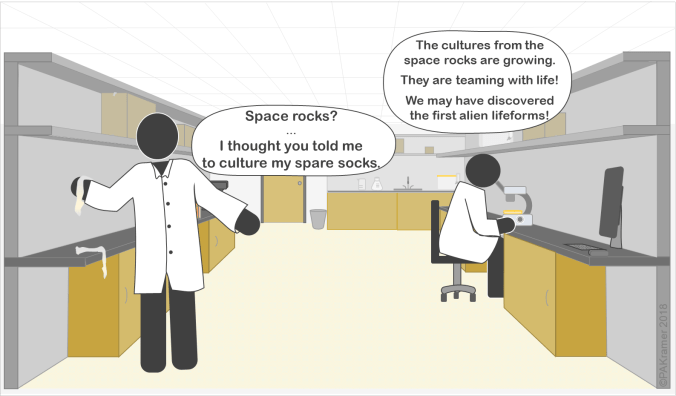
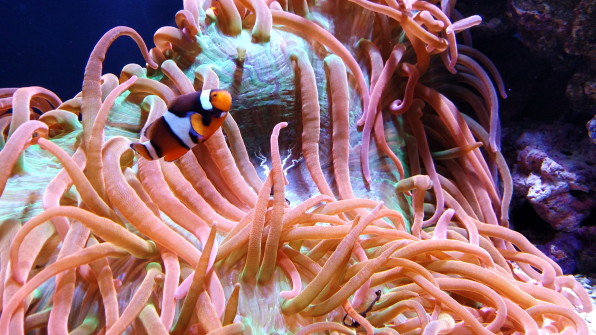

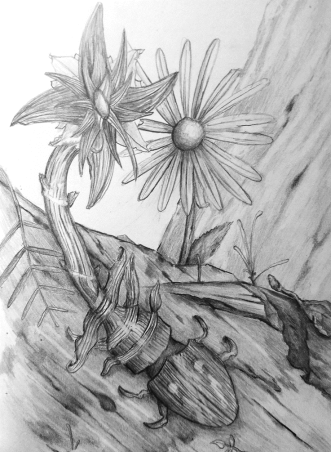

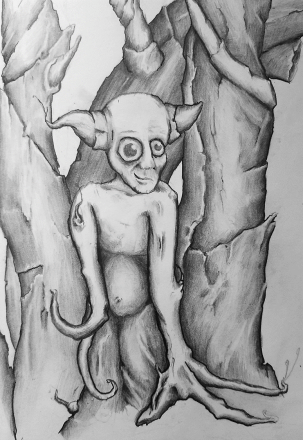

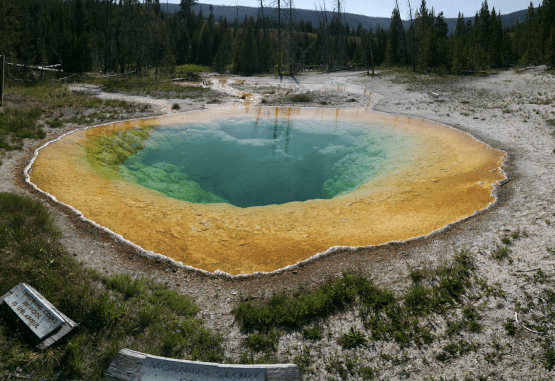
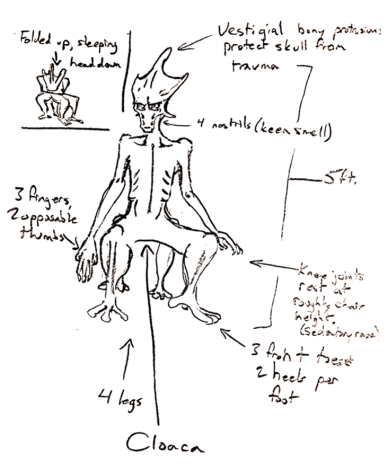

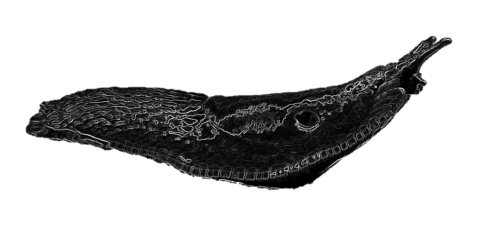

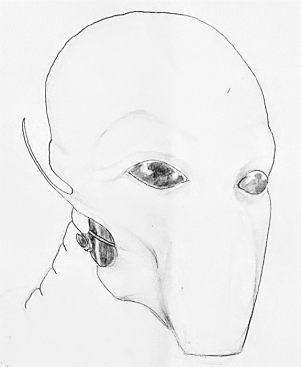



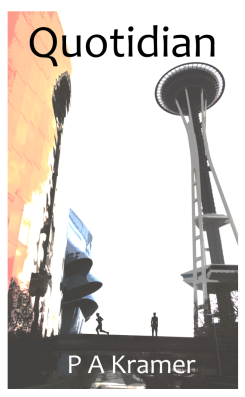
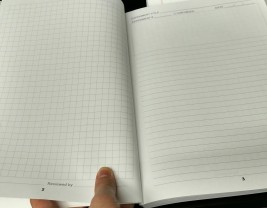

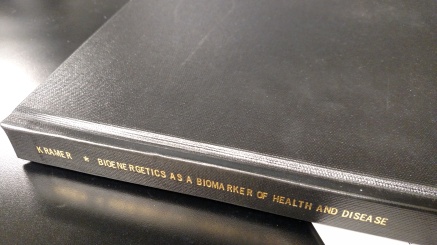

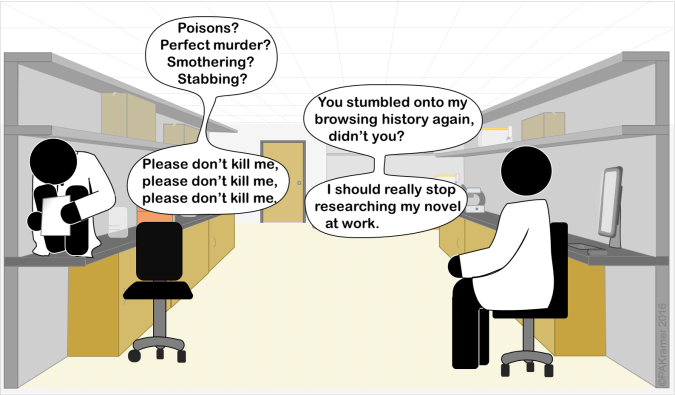 *** This post may contain some detailed and disturbing descriptions***
*** This post may contain some detailed and disturbing descriptions***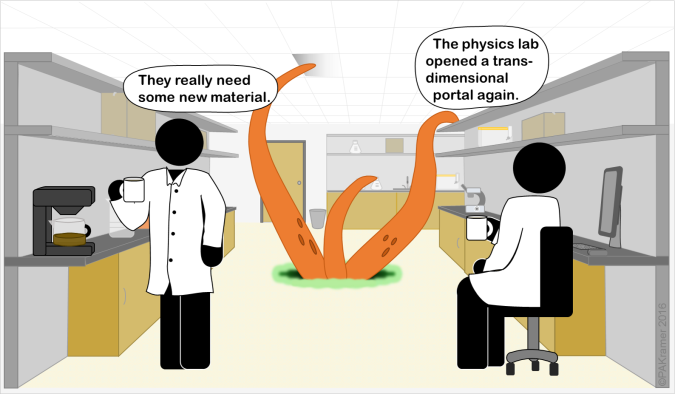

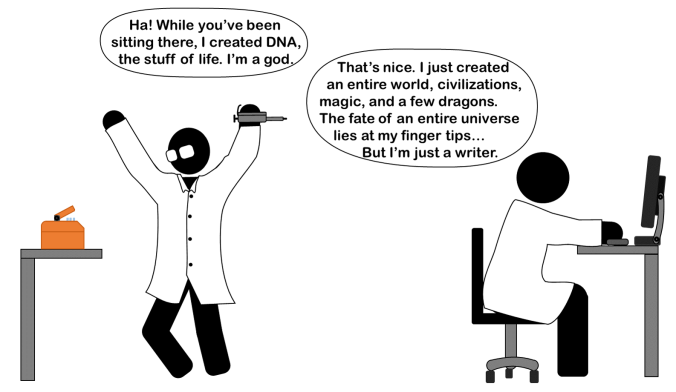


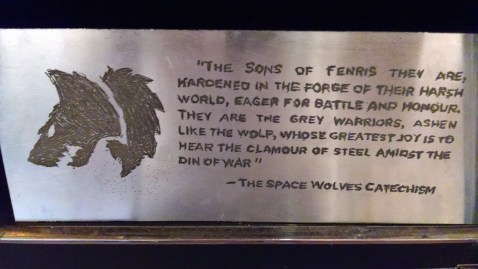
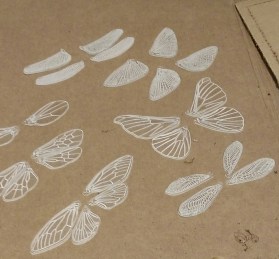





 If only it were that simple. Pretty soon these fledgling writers will leap from the cozy nest they were born in and try to soar to the starry heights of the literary skies. Unfortunately, many of them will plummet to the ground, their little wings incapable of bearing them up. Those that do rise will find that a cruel tempest lies between them and their goal. Once the reality sinks in, many writers will give up and lock their stories away where they can no longer embarrass them.
If only it were that simple. Pretty soon these fledgling writers will leap from the cozy nest they were born in and try to soar to the starry heights of the literary skies. Unfortunately, many of them will plummet to the ground, their little wings incapable of bearing them up. Those that do rise will find that a cruel tempest lies between them and their goal. Once the reality sinks in, many writers will give up and lock their stories away where they can no longer embarrass them.




